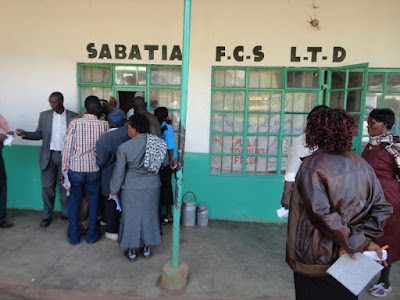By Bob Aston
Sabatia Farmers
Cooperative Society Ltd in Eldama Ravine Town is slowly gaining its status as
the most successful cooperative in Baringo County. Established in 1953 the
cooperative once hosted a delegation led by the founding president Jomo
Kenyatta.
The collapse of Kenya
Cooperative Creameries (KCC) in late 1990s affected the cooperative as milk
prices reduced. Things only started improving after revival of New KCC and
entrance of Brookside Dairy in Eldama Ravine.
 |
| Community members buying milk and yoghurt at Sabatia Farmers Cooperative |
Mr. Peter Kasaon, Vice Chairman Sabatia Farmers Cooperative Society Ltd said that the organization has a milk bar, milk-processing plant, and a dairy meal-manufacturing outfit. The organization mainly draws its membership from the agricultural rich Sabatia Settlement Scheme.
The 3,490 members of the cooperative supply nearly 8,500 litres of milk per day. Installed at the cooperative premises is a 10,000-litre and 5,000-litre capacity milk cooler. In addition, the cooperative has a satellite cooler at Kiboron. The cooperative charges the members 18 percent of their sales to enable them pay salaries for its 34 employees, cater for transport as well as other expenses.
Mr. Kasaon said that a 3.9
million loan from the Kenya Commercial Bank (KCB) helped to revive its dairy
meal manufacturing plant.
“The dairy meal
manufacturing plant has not only helped to increase access to livestock feeds
but farmers are now able to buy animal feeds at lower prices,” said Mr. Kasaon.
The loan was as a result
of a Memorandum of Understanding (MOU) between Baringo County Government and
KCB Foundation, which aims at enabling dairy farmers’ access credit services
including interest free loans, training in proper livestock production,
development, and management of the value chain.
The dairy
meal-manufacturing plant produces an average of 2,500 kgs of dairy meal a day.
The members buy the dairy meal in packs of 10 kgs, 20 kgs, and 70 kgs.
Next to the dairy meal manufacturing
plant is a milk bar and a milk processing plant. The Society does not have a
boiler hence they have to boil milk-using firewood. The cooperative does value addition at the
milk processing plant by producing yoghurt and Maziwa Mala.
Mr. Kasaon said that the
members receive farm inputs at the agrovet and dairy meal manufacturing plant
through a check-off system. This has ensured that other traders do not exploit
the farmers and at the same time enabling them to increase milk production.
Use of Information and
communication technologies (ICT) has enabled the cooperative to use digital
weighing scales and farmers electronic pay slip. The farmers’ milk deliveries
are stored on their proximity cards and they get printed receipts of the daily
weighed kilos. Members are also able to receive monthly milk deliveries as well
as other reports.
 |
| Laikipia Maize farmers at Sabatia Farmers Cooperative during an exchange visit |
“We also have an ICT
training centre where members and their families receive training in basic ICT
skills. Payment is through deductions
from member’s milk sale,” said Mr. Kasaon.
The cooperative has
outsourced Artificial Insemination (AI) services in order to ensure that
members improve their breeds. The members pay for the service through a
check-off system as the members are deducted the cost when they deliver milk.
The cooperative is planning to outsource transport services although they have
a pickup and a lorry.
Joining the cooperative requires
a Kshs 500 registration fee and daily delivery of milk. The cooperative can
also deduct registration fee from the first month’s milk payment when a farmers
does not have cash.
To be eligible to vie for
any elective post in the cooperative one must be delivering at least 15 litres
of milk a day. Elections are after every three years with each of the three
administrative units of Sabatia scheme producing three-management committee
member.
The cooperative is also a
member of Baringo Agricultural Marketing Services Cooperative Society Limited
(BAMSCOS).The umbrella organization formed in August 2012 is helping to
facilitate farmer’s access to profitable markets for their farm produce as well
as provision of production support services and championing farmer’s interest
through advocacy.
Mr. Kasaon believes that
despite the high cost of dairy meal products and fluctuating milk price the
cooperative is on track to regain its status as one of the most successful
cooperative organizations in Kenya.
No comments:
Post a Comment